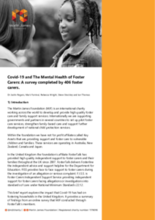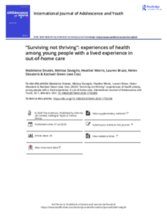Displaying 361 - 370 of 2221
This brief report explores the impact that Covid-19 has had on fostering households in the United Kingdom.
The purpose of this study was to identify changes in knowledge, skills and efficacy of foster caregivers who received trauma coach services.
This study aimed to explore the experiences and perceptions of health among young people (YP) who have previously lived in care.
The briefing begins by providing a brief overview of the current situation for care experienced young people in Scotland, highlighting significant recent developments which provide a context for discussions about the impact of lockdown on care leavers.
In response to the continuing need for agencies providing residential care and treatment to children and youth to develop and/or to enhance their ability to examine the effectiveness and efficiency of their services, this article explores successful strategies for building and sustaining research capacity in these settings.
This article reports the findings of MIRRA, a participatory research project on the memory and identity dimensions of social care recordkeeping.
This conference seeks to explore how such diverse perspectives can inform a new ethics of adoption and the care of orphaned or abandoned children in Muslim communities.
This study presents findings from a systematic review of interventions that target successful reunification.
This investigation applied contextual action theory and action-project method to the study of foster coparenting and the integration of children into the family.
This study describes healthcare utilization from July 1, 2014 to June 30, 2016 among children in foster care in the greater Houston, Texas area who receive Medicaid coverage through a single Medicaid managed care organization for children in foster care.



